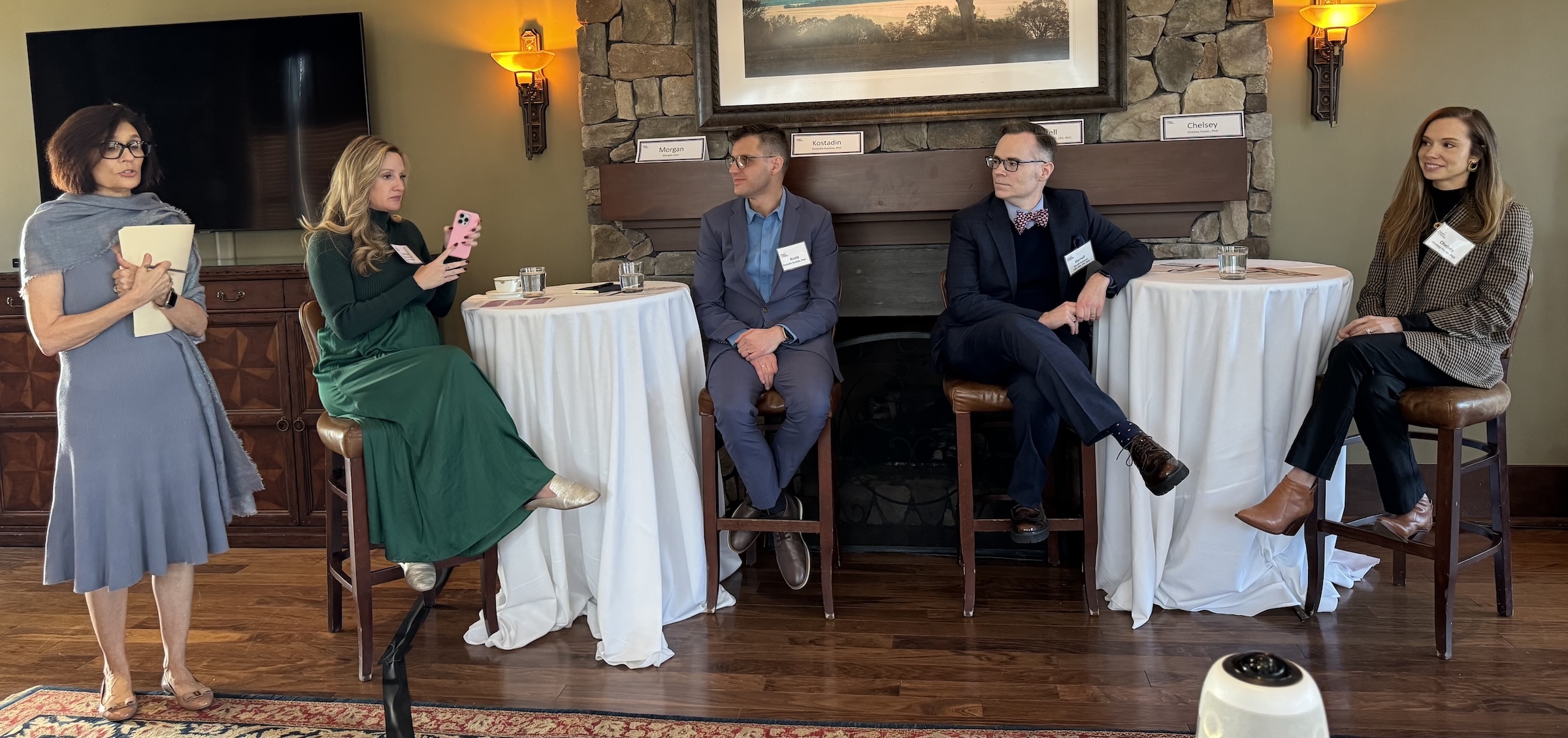Champions for Children Seminar: Balanced and Mindful Strategies for Social Media Use

Paula Widerlite introduces the panelists: Dr. Kostadin Kushlev of Georgetown University's Digital Health and Happiness Lab; clinical psychologist Dr. Chelsey Barrios Foster and Darrell Sampson who implemented the Away for the Day cell phone restriction in Arlington public schools.
A young mother raised her hand during a panel discussion recently and very earnestly asked the distinguished experts what she can do to protect her child against the negative aspects of social media.
The experts gently reassured her and stressed that a calm, deliberate and practical approach surrounding social media is best. Then, before offering specific suggestions, they asked her child’s age.
The mother ruefully replied, “Six months.”
The room erupted in laughter, but this mother’s looming and palpable anxiety is indicative of the feelings of many parents today who are struggling with setting social media safeguards for their children.
The discussion, held Feb. 26 at TPC Potomac at Avenel Farm, was sponsored by Champions for Children, a nonprofit committed to raising awareness about children’s mental health and wellbeing. During Digital Childhoods: Social Media and the Mental Health of the Next Generation, experts discussed tips for helping families and children handle the challenges of living in a digital era.
Three panelists spoke at the session: Kostadin Kushlev, PhD, principal investigator of the Digital Health and Happiness Lab at Georgetown University, who researches how smartphones and social media affect health and wellbeing; Chelsey Barrios Foster, PhD, a licensed clinical psychologist specializing in anxiety, depression, and perinatal mental health and Darrell Sampson, EdD, MA, LPC, NCC, executive director of the Office of Student Services at Arlington Public Schools, who has implemented the Away for the Day cell phone restriction program to benefit student and teacher wellbeing.
Ignoring sensational headlines and setting mindful limits and realistic goals for effective use of technology is essential to successfully navigating social media, the panelists agreed.
Social media can be a mixed bag and it’s important for adults to recognize its positive aspects and be aware of potential problems and pitfalls. With this awareness, it’s vital to have a thoughtful strategy for guiding children through the technology maze, the panelists said.
“Not all social media is bad,” Sampson said. “It’s how you navigate it.”
Despite adult fears the digital world contains harmful aspects, social media “educates and prepares students for jobs in the modern world,” he said. “Kids will find a way to use technology whether we like it or not.”
Even if it makes them uncomfortable, parents must learn to adapt to the digital era in constructive ways. Students “must be digitally literate and capable of using and collaborating on devices.” Sampson added, quipping, “Who thought 'Influencer' would be a job?”
Social media also can be beneficial for isolated and underserved communities and can serve as an extension of already established relationships, but Sampson cautioned it’s “not a replacement for relationships.”
Social media encompasses many popular digital platforms including Facebook, Instagram and YouTube, said Georgetown's Kostadin Kushlev. “It’s any platform where users can create content.” He added that video gaming, a popular pastime for teens, is considered a separate category.
Gaming can provide a sense of confidence, autonomy and collaboration, Kushlev said. Negative effects arise from over-use, he said. He is currently recruiting parents and adolescents for a study on the effects of social media on mental health.
Young people receive both social approval and rejection simultaneously from social media, said clinical psychologist Chelsey Foster. The positive validation of getting likes can be addictive, added Foster, who specializes in helping parents respond to the challenges of the digital age and has expertise in treating anxiety, depression, OCD, ADHD, emotional disregulation and stress-related disorders.
Setting social media limits is important, Foster said. Parents must be prepared to set firm and clear age-appropriate boundaries up front and be ready to uphold them, she added.
Foster recommends talking with children about the privilege of engaging on social media and setting definitive boundaries. Then go through each app and outline acceptable uses and behaviors. Parents should have access to the apps their children use and check in occasionally to make sure kids are using the platforms responsibly, she added.
She also recommends designing a written contract between parents and children with specific boundaries and guidelines for responsible social media use. The contract isn’t written in stone and can be revised and updated as circumstances change, she said.
Schools also have an important role to play surrounding social media use. Sampson said. Both families and schools must set guidelines for good behavior on social media and make sure kids are prepared to engage with these mediums appropriately.
Panelists reminded parents to practice what they preach when it comes to appropriate social media etiquette. “Modeling is important,” said Sampson, the Virginia educator. “As educators and adults, we need to set limits on (our) phone use.”
It’s also important to give children space for autonomy and some agency when it comes to social media use. Foster said constant parental contact via texting and location apps can get in the way of kids developing a sense of independence and detract from experiences when they are always on their phones.
Parent education about social media is valuable, and schools offer workshops to help parents navigate tricky issues. Schools also must embed digital citizenship into the curricula, Sampson said.
For more information or to join Champions for Children, visit
www.championsforchildrendc.org or Champions for Avenel resident and Children Founder Paula Widerlite at widerlite@gmail.com